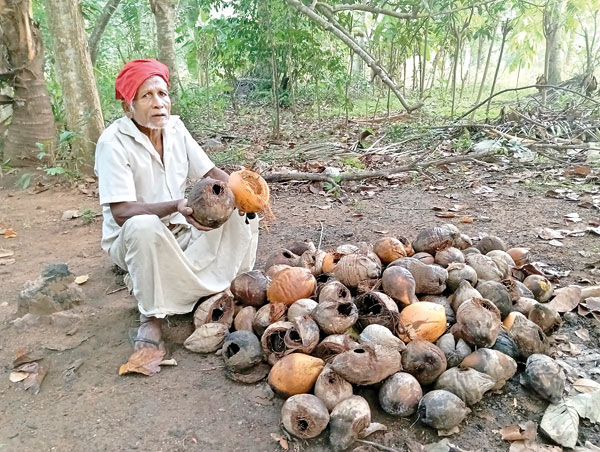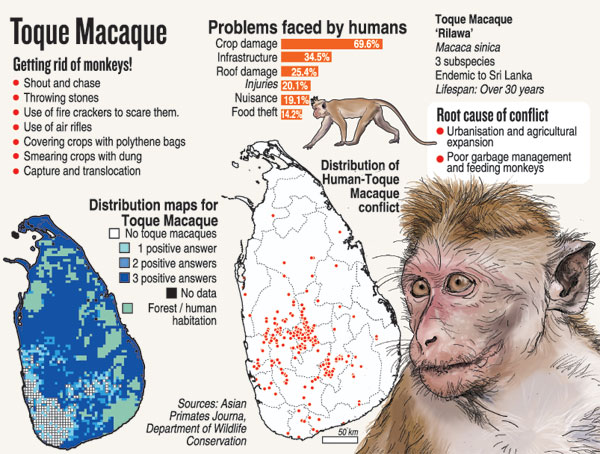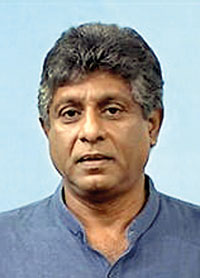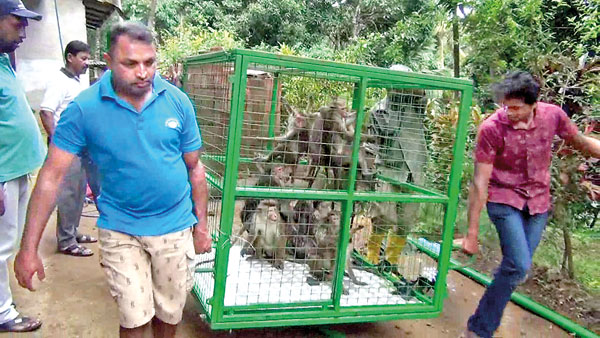News
Follow the science to wrestle with crop pests, experts advise
View(s):By Kasun Warakapitiya
Instead, a scientific approach is needed to provide a sustainable solution, they say.
DWC Director General Chandana Sooriyabandara told the Sunday Times that solutions for certain environmental problems cannot be devised overnight.

Damage to coconut crops in Karuwalagaswewa. Pic by Jayaratne Wickramaarachchi
He explained that they as government officials understand the problems faced by the farmers when macaque monkeys, peacocks, and giant squirrels as well as elephants damage crops, but, the problem needs to be understood scientifically to find permanent solutions.
The DWC, too, agrees on scientific solutions for the long-term.
According to him, managing populations through sterilisation of selected groups of animals is a long-term method. It would be a permanent solution if done for several years.
He said that maintaining animal populations should be carried out with utmost care so the environmental balance would not be affected.
The Sunday Times observed coconut cultivations damaged by monkeys as well as damage done by giant squirrels.
Villagers say that their crop has been damaged by the bad weather and the yields have dropped. Even a small amount of pest damage is a loss.
Animals are attracted to cultivations and human settlements due to favourable conditions such as the availability of food.
The abundance of domestic waste and offering of food attract animals such as macaque monkeys, which ransack homes for meals and raid agricultural lands.

Pest-related damage has gradually increased over the years. Habitat loss has brought animals closer to human habitation and drawn them to cultivation areas and they have adapted to forage for food in populated areas.
In the past, too, experts related to wildlife, agriculture, and the environment reached a consensus that a scientific approach is needed to control the number of wild animals through sterilisation, or culling.
From 2018 to 2022 the Agriculture Ministry has facilitated several stakeholder consultations regarding the management of crop damage by wild animals.
The consultation was held on December 29, 2022 at the Hector Kobbekaduwa Agrarian Research and Training Institute (HARTI). A report on “Conflict between Farmers and Wildlife” was prepared by HARTI and handed over to the then agriculture minister in March, 2023.
Buddhi Marambe, senior professor at the Department of Crop Science at the Faculty of Agriculture at University of Peradeniya, who moderated the consultation said all who took part came to an understanding that the population of wild animals which damages crops and severely affects human livelihood needs to be controlled using scientific methods, while understanding the biology and the environments in which they survive.
Wildlife invades areas inhabited by human populations due to shortage of resources in the natural habitats they live in. When the wildlife is managed, the animals could remain in their habitat based on the carrying capacity of the ecosystem, he said.
He said that at the moment, the most crop damage is done by macaque monkeys and controlling their numbers should be a priority.
He said that a government driven mechanism should be in place to control the number of pest animals, without allowing farmers or others to use ad-hoc methods, which could even lead to the eradication of animals.
The government should not try to address all macro-pest related issues but select the pest animal which causes the most damage, he said.
In this case, monkeys could be targeted first, in selected areas where the negative impact is extremely high, but not across the country. About a third, or a scientifically calculated number of the monkey population in such areas can be controlled using legal methods such as licensed firearms. A para-military group or similar setup can be set up for selective culling.
He said that once the initial culling is done, targeting a third of the population in selected regions, it will provide short-term results and reduce the adverse impact on agriculture. Initiatives such as sterilisation, export of animals, can be done in a planned manner to maintain manageable populations.
Ashoka Dangolla, well known veterinarian and professor in veterinary clinical science at the University of Peradeniya also emphasised the importance of research on population control of toque macaques.
He suggests extensive research on their reproduction as well as how to manage their population.
“First we have to understand that the macaque monkey which is coming near human settlements is a wild animal that has become a community animal. The animal has learned that it could survive in populated areas as they get food, water and security,’’ he said.
He said feeding monkeys and improper garbage disposal lure macaques to populated areas. And as food is in abundance, the monkeys breed.
“People should first maintain their distance from monkeys and avoid feeding them. They should prevent easy access to food and water.’’
Making statements before addressing the issues and trying to defend their positions while rejecting scientific solutions, caused previous governments to fail, said Professor in Zoology at the University of Colombo, Sampath Seneviratne.
He said that politicians pretend to be all-knowing before gaining power, yet when in power, they make statements without understanding the issues. Unfortunately, the new government is treading the same path.
He said that a national level approach is needed with multi sectoral engagements.
“When it comes to a broad issue such as reducing pest damage, the solutions differ from species of animal, terrain, and the variety of crop,’’ he said. According to him, scientific methods should be tried out.
He also said the conflict had escalated over the years and solutions could be found by understanding how farmers dealt with it in the past.
Meanwhile Agriculture Minister Lal Kantha said that they have planned to remove macaque monkeys and other pests in farm areas.
He said if this programme is not carried out one would not be able to talk about improving the agriculture sector. He added that they would also consider exporting monkeys and also consider a proposal to send the monkeys to Sri Lanka’s uninhabited islands. This would be tied up with promoting tourism too. He added that they would not leave the monkey issue to be solved by the next generation.
Meanwhile environmentalists claim that the minister should make statements after studying the issue. They point out scientific data should be used as actions are taken in an ad hoc manner.
 Ashoka Dangolla 3D printed birth control device is an option Veterinarian, and professor in veterinary clinical science at the University of Peradeniya, Professor Ashoka Dangolla said that he is willing to share his knowledge with the government if a mechanism is created for sterilisation of monkeys. He is one of the first veterinarians who had researched sterilising of monkeys by using a modified intrauterine device (IUD). He said castration of male monkeys is difficult. All the males in a troup will have to be sterilised and when the juvenile males mature the process needs to be repeated. The IUD could be 3D printed and fitted with copper ends. The cost of one IUD would be Rs 100. Human IUDs cannot be used as the uterus of monkeys is three times smaller, he said. “However, an IUD should be implanted at a crucial time, where its hormonal conditions are favourable. It can be done simply and the animal can be released after the procedure,’’ he said. One group of monkeys which had been subjected to the experiment had retained the IUD over three months, he said. Further monitoring of monkeys is required after
| |
| Capture and sterilisation of monkeys in Matale A Pilot project to capture and sterilise toque macaques was initiated at Ihala Harasgama area, Matale. The captured monkeys were taken to the Giritale wildlife veterinary office. The capturing of monkeys began on Thursday and the monkeys were transported to the wildlife centre on Friday to undergo surgery. The officers at the veterinary office said that around 25 toque macaque monkeys were brought in and that they had done some on Saturday. A senior wildlife official who declined to be named said that the monkeys that were sterilised should be marked before being released into the wilds again, to avert recapturing. Meanwhile another official assured that they would return the monkeys to the same locations from where they were captured. Animal rights activist and Executive Director of Rally for Animal Rights and Environment (RARE) Panchali Panapitiya criti-cised capturing monkeys without a plan. She added that scientific solutions should be found other than sterilising animals according to whim.  Pic by Mahesh Keerthiratne Demonisation of environmentalists condemned Environmentalists and conservationists have slammed those who are attempting to demonise conservation efforts. Environmental activist, Dr Jagath Gunawardana told the Sunday Times that environmental activists are being demonised and influential elements are fuelling this campaign. Initially, environmentalists were talking about the killing of tuskers. Following that some news about toque macaques surfaced with mudslinging against environmental activists. He said the monkey issue was stirred up deliberately among farmers by some groups to target conservationists. “I decided to withdraw from most activities from December 2 and these subsequent incidents have amply demonstrated that I have taken the cor-rect decision.’’ Meanwhile, animal rights activist, Panchali Panapitiya, executive director of Rally for Animal Rights and Environment (RARE) complained that they too feel that the government is trying to create a rift between the people and environmental and animal rights activists. Even though Environmental Minister Dammika Patabandi met conservation organisations, three of the largest had not been invited, she said. Her organisation had joined the meeting as a third party invited them. Activist suggests rational approach Environmental activist and researcher, Supun Lahiru Prakash told the Sunday Times that there is no difference between previous governments which tried to issue firearms to farmers and the current government where the agriculture minister and a leading politician said there are no legal issues over farmers taking actions against wild animals on their own lands. The human-wildlife conflict is a long-term issue and there are no hard and fast solutions. “Rational governments should look at this issue in a scientific way rather than making mindless statements. The government is not only for the humans but also for all the other living beings,” he said. He noted that at the beginning of the tenure of the government, the management of human-wildlife conflict was shifted from the Department of Wildlife Conservation to the Ministry of Agriculture like changing pillows to cure a headache and the minister’s statement is an extension of the gov-ernment’s wrong path in human-wildlife conflict mitigation. He called for a scientific and holistic approach. Apart from that, he urged the government to keep positive policy decisions unchanged. Translocation and long distance drives of elephants were stopped as they were ineffective. The Wildlife and Nature Protection Society of Sri Lanka (WNPS) issuing a statement pointed out that the human-wildlife conflict should be managed by avoiding unsustainable and environmentally damaging policies on farmland-associated wildlife. The statement said the WNPS is fully aware of the need for the protection of the nation’s farmers and their crops, which sustain the vital nutrition of the nation and the livelihood of the farmer. WNPS stressed that they do not support the illegal export or selling of animals, and do not support any further defor-estation as a means of resolving this conflict. They added that social safety nets such as crop insurance schemes are needed. Furthermore, urgent legal reforms are needed to punish behaviour which encourages conflict such as wildlife feeding and poor food disposal. |
3D printed birth control device is an option
Veterinarian, and professor in veterinary clinical science at the University of Peradeniya, Professor Ashoka Dangolla said that he is willing to share his knowledge with the government if a mechanism is created for sterilisation of monkeys. He is one of the first veterinarians who had researched sterilising of monkeys by using a modified intrauterine device (IUD).
He said castration of male monkeys is difficult. All the males in a troup will have to be sterilised and when the juvenile males mature the process needs to be repeated.
The IUD could be 3D printed and fitted with copper ends. The cost of one IUD would be Rs 100. Human IUDs cannot be used as the uterus of monkeys is three times smaller, he said.
“However, an IUD should be implanted at a crucial time, where its hormonal conditions are favourable. It can be done simply and the animal can be released after the procedure,’’ he said.
One group of monkeys which had been subjected to the experiment had retained the IUD over three months, he said. Further monitoring of monkeys is required after
the procedure.
The best way to say that you found the home of your dreams is by finding it on Hitad.lk. We have listings for apartments for sale or rent in Sri Lanka, no matter what locale you're looking for! Whether you live in Colombo, Galle, Kandy, Matara, Jaffna and more - we've got them all!

